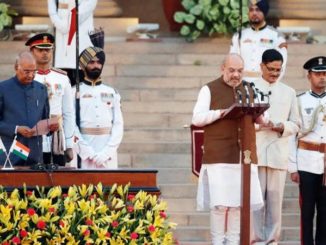
BRUSSELS (TIP): The five top candidates to head the European Commission swapped accusations on Thursday over the impact of Europe’s austerity measures and the role played by banks in sparking the economic and financial crisis. In an often heated debate in Brussels, several candidates were forced onto the backfoot by Greek radical-left leader Alex Tsipras, who wasted no time in denouncing “catastrophic austerity policies” and demanding an exit from “debt paranoia”.
Conservative leader Jean-Claude Juncker, the former prime minister of Luxembourg who headed the single-currency Eurogroup for eight years, pounced on Tsipras’s remarks, rejecting the suggestion he had not acted in the best interests of Greece. “I worked for years, day and night, to prevent Greece leaving the eurozone,” Juncker said, adding that he had done everything in his power to help the ailing country while endeavouring to get its public finances in order.
Guy Verhofstadt, the candidate from the centre-right liberal grouping ALDE, mocked Tsipras’s suggestion that banks and EU banking policies were to blame for southern Europe’s economic woes. “In Greece, in Italy, it wasn’t a matter of banking, but bad policies on the part of your political parties,” Verhofstadt told Tsipras, defending the need for fiscal discipline in the EU as it struggles to move out of recession.
“You need fiscal discipline, otherwise you cannot have growth… and that means making no new debt,” Verhofstadt said, adding that the best way forward was to make the most of the EU’s common market by removing economic barriers within the 28-member bloc. Greens leader Ska Keller, the only woman in the race to become the next president of the European Commission, said that more austerity in the EU would “worsen the situation”, but called on member states to do more to invest in “sustainable jobs” in renewable energy.
Socialist leader Martin Schulz, the outgoing president of the European Parliament, agreed the EU had made a mistake in “unilaterally cutting” spending, but pointed to the fight against tax fraud and tax evasion as the best way of providing relief to state coffers. The debate was the first of its kind to include all five parties in the running for the Commission presidency, which is the highest executive position in the EU.
In a break from earlier formats, three of the candidates spoke English, while Juncker chose French and Tsipras used Greek. The event, broadcast from the European Parliament building in Brussels by 50 TV stations and a variety of radio stations and websites across Europe, was moderated in English by an Italian journalist. With 10 days left in the European parliamentary election campaign, all eyes had been on Tsipras, the former communist who had previously eschewed public debates.
– Call for a common immigration policy –
One of the only two moments of policy agreement in the debate came when discussing the EU’s policy setting on asylumseekers, following another shipwreck off the coasts of Italy this week which claimed 17 lives. Verhofstadt, a former Belgian prime minister, said that part of the problem was the EU’s lack of a common legal immigration policy, which in turn exacerbated the problem of illegal arrivals.
Tsipras argued it was “unacceptable… to allow the Mediterranean to turn into a graveyard”, saying Europe needed to become “synonymous with solidarity”. Keller called the absence of a coordinated immigration policy a “scandal“, while Juncker agreed that the time had come for “a European law dealing with migration”, urging EU members not to cut their aid budgets to better assist people before they undertook the perilous journey across the Mediterranean.
The candidates also concurred on the responsibility on the part of EU member states to appoint one of them, as the leaders of political groupings in the European Parliament, to replace current Commission President Jose Manuel Barroso after the May 22-25 poll. Under new rules, member states are required to “take into account” the results of parliamentary elections in appointing the new Commission chief. However, it remains unclear whether that amounts to a legal obligation to appoint party leaders.
“It is finished the idea that the Commission president would be the result of a backroom deal — this is finished,” Schulz said. “If they really dare to nominate another (candidate), the answer is quite clear: you will get no majority in the European Parliament.” Juncker agreed, saying that to not appoint a party leader would be a “denial of democracy” and would imply that European citizens no longer mattered in the EU.





Be the first to comment